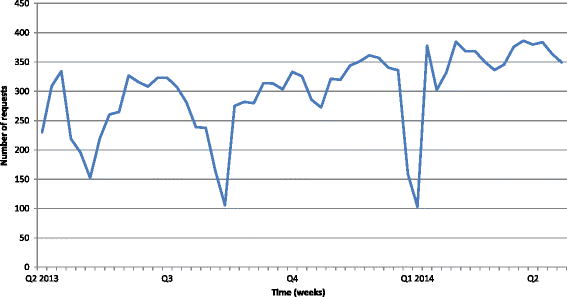Exposure to and experiences with a computerized decision support intervention in primary care: results from a process evaluation
- PMID: 26474603
- PMCID: PMC4608282
- DOI: 10.1186/s12875-015-0364-0
Exposure to and experiences with a computerized decision support intervention in primary care: results from a process evaluation
Abstract
Background: Trials evaluating the effects of interventions usually provide little insight into the factors responsible for (lack of) changes in desired outcomes. A process evaluation alongside a trial can shed light on the mechanisms responsible for the outcomes of a trial. The aim of this study was to investigate exposure to and experiences with a computerized decision support system (CDSS) intervention, in order to gain insight into the intervention's impact and to provide suggestions for improvement.
Methods: A process evaluation was conducted as part of a large-scale cluster-randomized controlled trial investigating the effects of the CDSS NHGDoc on quality of care. Data on exposure to and experiences with the intervention were collected during the trial period among participants in both the intervention and control group - whenever applicable - by means of the NHGDoc server and an electronic questionnaire. Multiple data were analyzed using descriptive statistics.
Results: Ninety-nine percent (n = 229) of the included practices generated data for the NHGDoc server and 50 % (n = 116) responded to the questionnaire: both general practitioners (GPs; n = 112; 49 %) and practice nurses (PNs; n = 52; 37 %) participated. The actual exposure to the NHGDoc system and specific heart failure module was limited with 52 % of the GPs and 42 % of the PNs reporting to either never or rarely use the system. Overall, users had a positive attitude towards CDSSs. The most perceived barriers to using NHGDoc were a lack of learning capacity of the system, the additional time and work it requires to use the CDSS, irrelevant alerts, too high intensity of alerts and insufficient knowledge regarding the system.
Conclusions: Several types of barriers may have negatively affected the impact of the intervention. Although users are generally positive about CDSSs, a large share of them is insufficiently aware of the functions of NHGDoc and, finds the decision support not always useful or relevant and difficult to integrate into daily practice. In designing CDSS interventions we suggest to more intensely involve the end-users and increase the system's flexibility and learning capacity. To improve implementation a proper introduction of a CDSS among its target group including adequate training is advocated.
Trial registration: Clinical trials NCT01773057 .
Figures
References
-
- Committee on Quality of Health Care in America Institute of Medicine. To err is human: building a safer health system. Washington DC: National Academies Press; 2000. - PubMed
-
- Committee on Quality of Health Care in America Institute of Medicine. Crossing the quality chasm: a new health system for the 21st century. Washington DC: National Academies Press; 2001.
Publication types
MeSH terms
Associated data
LinkOut - more resources
Full Text Sources
Other Literature Sources
Medical



